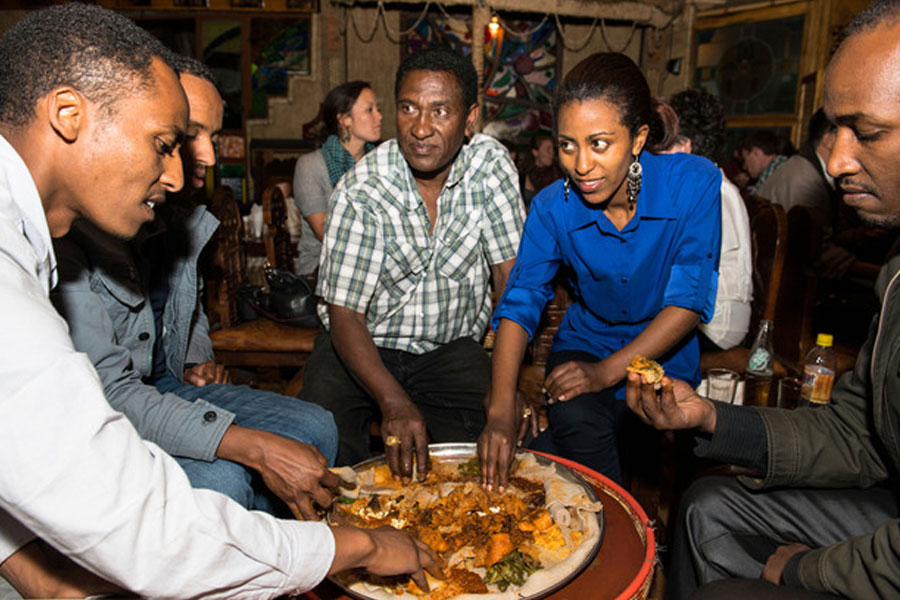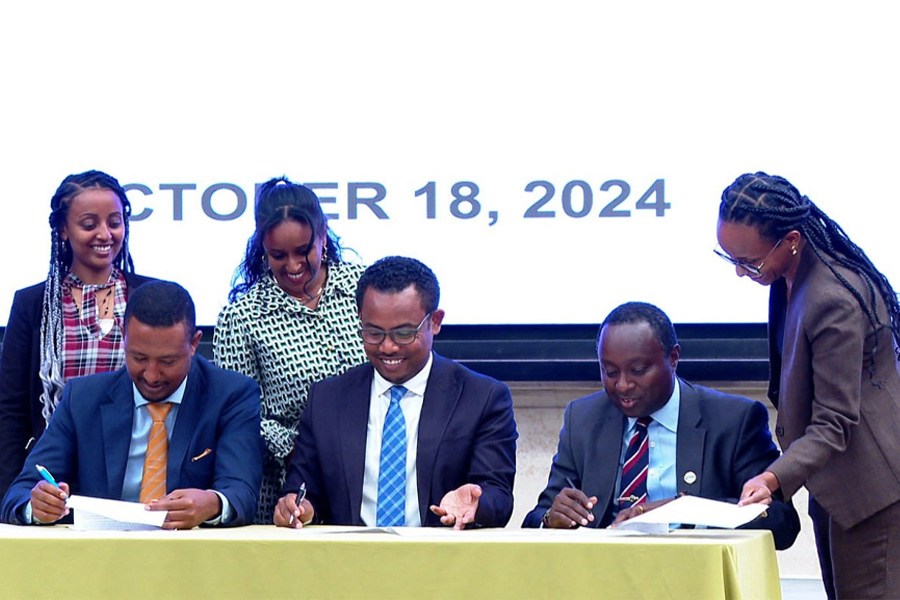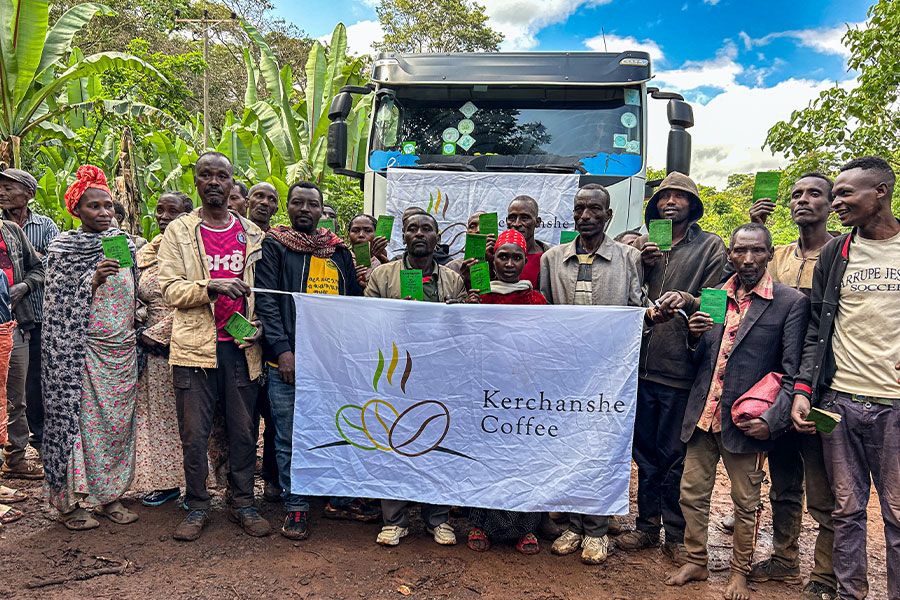
Radar | Nov 03,2024
Jun 14 , 2025
By Kidist Yidnekachew
On multiple occasions, I have found myself watching the garbage collectors on their morning route, a subtle unease settling in. There is a somber reality to their work, a reminder that in a world of vast opportunity, some find their roles confined to clearing away what others discard. It is the kind of observation that opens a corridor of reflection on the infrastructures that quietly shape daily life: the destinations of waste, the hidden labour behind sanitation, and the silent burdens borne by those who manage society’s refuse.
Amid such contemplation, an odd yet telling detail stands out. The neighborhood dogs, vocal and insistent, seem to have formed strong opinions about these workers.
Modern life runs on the rails of convenience. Items are consumed, discarded, and forgotten with the ease of a flicked switch. Yet behind that ease lies a chain of human effort, rarely seen and less frequently acknowledged. The question of where waste goes after being cast aside leads inevitably to those who shoulder its burden.
Sanitation workers, often noticed only in passing and announced by the hum of machinery at dawn, endure conditions that many would find intolerable. There is the stench that clings to their uniforms, the strain of lifting overflowing bins, and the dispiriting task of sorting through others’ carelessness. The toll, physical and psychological, is significant. Research consistently points to elevated health risks in this line of work, worsened by social stigma that renders their labor invisible even as it undergirds everyday life.
This aversion to engaging with waste continues in subtler ways. The journey of what disappears down the toilet, for instance, remains largely unexplored in public consciousness. Even beneficial innovations like wastewater treatment or biogas energy generation evoke discomfort. Such reactions stem not from science, but from a deep-seated reluctance to confront the less polished parts of human existence. Waste. literal and symbolic, is meant to be removed, not reflected upon.
And yet, in the midst of this reflection, another small phenomenon arises; the barking of dogs. It may seem trivial, even amusing, but it hints at something more. Certain individuals, often those in uniforms or covered in the markers of manual labor, receive disproportionate attention from neighborhood pets. Mechanics, delivery personnel, sanitation workers, these figures often elicit a full-throated canine response, while a sharply dressed passerby might be ignored altogether.
This is not a simple case of canine discrimination, but rather a complex interplay of a dog’s highly attuned senses and their deep-seated instincts.
Dogs observe the world with an intensity unfamiliar to human perception. Their world is a rich tapestry of scents, sounds, and subtle visual cues that often go unnoticed by our comparatively dull senses. Their reactions stem from an intricate web of visual cues, scents, and daily routines. A garbage collector who appears regularly but never enters the home disrupts the ordinary, triggering territorial instincts. Uniforms, too, become signifiers of the unfamiliar, a coded alert for the hyper-vigilant senses of a dog.
Smell plays an even greater role. Sanitation workers carry with them traces from dozens, even hundreds, of locations. To a dog, this invisible trail transforms the worker into an intrusion, a walking collection of foreign signals. It is not judgment, only instinct.
And beneath it all lies the emotional radar of dogs, finely tuned to the states of those around them. A person anxious around dogs may move stiffly or emit stress through body language and scent. That, in turn, heightens a dog’s alertness, sparking a loop of mutual suspicion. Calm, grounded presence often disarms this cycle, met not with barks but with curiosity or even friendliness.
In the orchestration of these morning moments, the arrival of the waste truck, the ripple of canine reaction, the retreat into routine, there’s a window into the systems that order the world and the instincts that respond to them. Beneath the noise, a deeper story unfolds: one of invisible labor, unspoken hierarchies, and the strange wisdom of animals. It is in such ordinary scenes that a society reveals itself, offering, to those willing to observe, a quiet education in empathy and attention.
PUBLISHED ON
Jun 14,2025 [ VOL
26 , NO
1311]


Radar | Nov 03,2024

View From Arada | Feb 10,2024

Fortune News | Jan 28,2023

Radar | Oct 19,2024

Advertorials | Jul 25,2025

Advertorials | May 30,2025

Delicate Number | Aug 03,2024

Radar | May 27,2023

Fortune News | Mar 11,2023

My Opinion | Apr 15,2023

Photo Gallery | 176020 Views | May 06,2019

Photo Gallery | 166234 Views | Apr 26,2019

Photo Gallery | 156662 Views | Oct 06,2021

My Opinion | 136867 Views | Aug 14,2021

Dec 22 , 2024 . By TIZITA SHEWAFERAW
Charged with transforming colossal state-owned enterprises into modern and competitiv...

Aug 18 , 2024 . By AKSAH ITALO
Although predictable Yonas Zerihun's job in the ride-hailing service is not immune to...

Jul 28 , 2024 . By TIZITA SHEWAFERAW
Unhabitual, perhaps too many, Samuel Gebreyohannes, 38, used to occasionally enjoy a couple of beers at breakfast. However, he recently swit...

Jul 13 , 2024 . By AKSAH ITALO
Investors who rely on tractors, trucks, and field vehicles for commuting, transporting commodities, and f...

Oct 18 , 2025
The political establishment, notably the ruling party and its top brass, has become p...

Oct 11 , 2025
Ladislas Farago, a roving Associated Press (AP) correspondent, arrived in Ethiopia in...

Oct 4 , 2025
Eyob Tekalegn (PhD) had been in the Governor's chair for only weeks when, on Septembe...

Sep 27 , 2025
Four years into an experiment with “shock therapy” in education, the national moo...

Oct 18 , 2025 . By NAHOM AYELE
In a sweeping reform that upends nearly a decade of uniform health insurance contribu...

A bill that could transform the nutritional state sits in a limbo, even as the countr...

Oct 18 , 2025 . By SURAFEL MULUGETA
A long-planned directive to curb carbon emissions from fossil-fuel-powered vehicles h...

Oct 18 , 2025 . By BEZAWIT HULUAGER
Transaction advisors working with companies that hold over a quarter of a billion Bir...